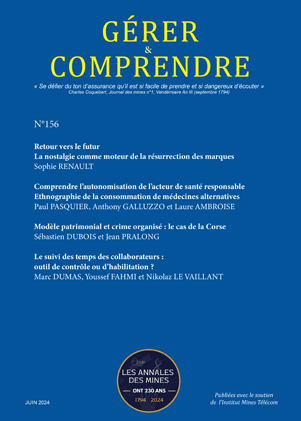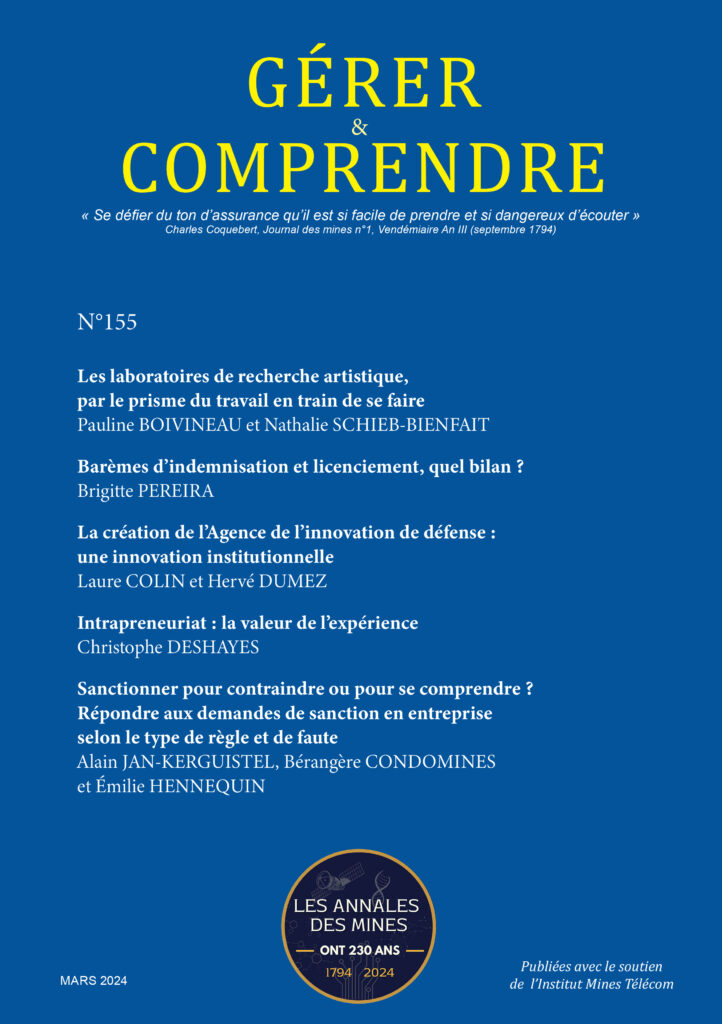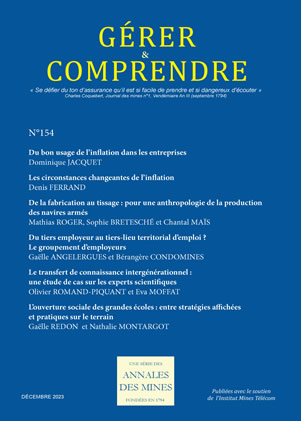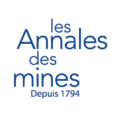NOTE TO AUTHORS
Gérer & Comprendre publishes original article proposals that have not been evaluated or published by another journal, and authorizes the submission by the same author of several works in parallel, subject to the aforementioned condition. Any use of Generative AI for any part of the article shall be explicitely mentioned and justified within the article.
Once accepted, the article is included in an issue to be published in print (200 copies) and online (open access). Distribution is also ensured by subscription to the Cairn.info platform. There is no charge to the author for publication.
Finally, the journal is protected by copyright. Reproduction in whole or in part is possible subject to the journal’s agreement and mention of the original publication.
HOW TO SUBMIT AN ARTICLE
Articles are generally around 40,000 characters in length, but longer articles may be published. Articles must be preceded by an abstract of around 1,000 characters. They should be sent by email to the following address:
and comply with the rules specified in the following document in the Formatting instructions for authors (in French).
Please do not leave any indication of the author in the body of the text (submitted anonymously to the board). Titles, abstracts, and illustrations are the sole responsibility of the editors.
CHOICE OF REVIEWERS
Under the “double-blind” rule, each article is assigned to at least two reviewers, who may or may not be members of the editorial board. The board calls on external assessors when the analysis of an article requires skills not available within the editorial board.
EDITORIAL BOARD DEBATES
The Committee meets eight times a year, every five to six weeks from September to June. Authors are systematically informed by return email of the period during which their article will be examined; on average, the decision is communicated within six weeks of submission.
The Gérer & Comprendre editorial board collectively decides on the position to be taken on each article, based on comments submitted by the reviewers. Each referee develops his or her own opinion, which fuels a debate when opinions diverge. After debate, a position is taken and communicated to the authors. Disagreements may need to be made public, either because they advance knowledge, or because the board’s differences are irreconcilable. The article is then published with the report of the reviewer who disagrees, and the author is given the right of reply.These debates help to gradually refine the journal’s editorial line and strengthen its identity.
INTERACTIONS BETWEEN AUTHORS AND THE BOARD
Every decision communicated to authors has been discussed collectively by the editorial board. Reasons are systematically given, together with the reviewers’ reports. Opinions sent to authors can be classified into four categories:
- ACCEPTED FOR PUBLICATION: The article will be published in the journal. The board may recommend minor corrections.
- REQUEST FOR V2 (SECOND VERSION) OR V3 (THIRD VERSION): The article may be published after a one-off project. The aim is generally to deepen or clarify certain points, or even to answer questions raised by the article. Where appropriate, authors are asked to append a note to the reviewers to the new version of their article, describing in detail the changes made to the text. The same reviewers are also responsible for evaluation. As editorial board meetings are held at regular intervals, there is no set date for submitting a V2 or V3. Nota bene: requesting a V2 or V3 in no way prejudges publication of the article in fine.
- REJECTED: The article cannot be published. See Rejection criteria below.
- REJECTED / RE-SUBMISSION: The material is deemed original and interesting, but the article falls short on too many points. Substantial reworking is required. If a new article is submitted, it may be evaluated by other reviewers.
Gérer & Comprendre can also evaluate articles written in English.
REJECTION CRITERIA
The easiest way to specify which articles the journal wishes to publish is to indicate its rejection criteria:
- ARTICLES THAT DO NOT COMPLY WITH ETHICAL STANDARDS: The board rejects any practice that violates scientific ethics and integrity, including plagiarism; in the event that the board is made aware of any allegation of research misconduct relating to a published article in the journal, the board and the Annales des Mines (editor) shall follow COPE’s guidelines in dealing with allegations;
- THEORETICAL CONSIDERATIONS BASED ON NO OBSERVATION OR EXPERIMENT: Even if Gérer & Comprendre goes beyond the clinical and experimental tradition from which it was born, it is wary of theoretical considerations deployed without confrontation with facts. More often than not, the board is skeptical about statistical validation methods, even though several of its members (who are not the least critical…) have extensive experience in teaching mathematical and statistical methods;
- DESCRIPTIONS WITHOUT CONCEPTS: In contrast to the previous case, what is at issue here is the defect of narration without theoretical structuring;
- WORK WITHOUT PRECISION OF SOURCES: Reporting observations or experiments naturally poses a problem: As the researcher is neither an invisible observer nor an impassive investigator, it is important to specify how the reported observations were made, so that the reader can judge for themself the disturbances that may have resulted from interactions between the author and the environment in which they were immersed;
- NORMATIVE USE OF THEORIES AND IDEAS: We have long dreamed of laws and general solutions in management, but this hope does not stand up to observation; articles that propose either implicitly or explicitly normative theories, or recipes presented as general, are practically always rejected;
- ARTICLES WRITTEN IN AN ABSTRUSE STYLE: However, it is in the dialogue between theory and practice that the most new knowledge is often born, as shown by the dialogues of the Enlightenment, whose legacy is carried on in Annales des Mines. But for this to happen, the style has to be sufficiently clear and lively to encourage reading by those who have no direct career interests at stake; in such cases, the board sometimes helps authors to improve the form of their texts.
But no paper is perfect: some articles fail to meet the above criteria. But it’s also the board’s job to know which flaws to absolve: and Gérer & Comprendre is always careful to encourage truly original thinking, even if it falls foul of the rules set out above.



